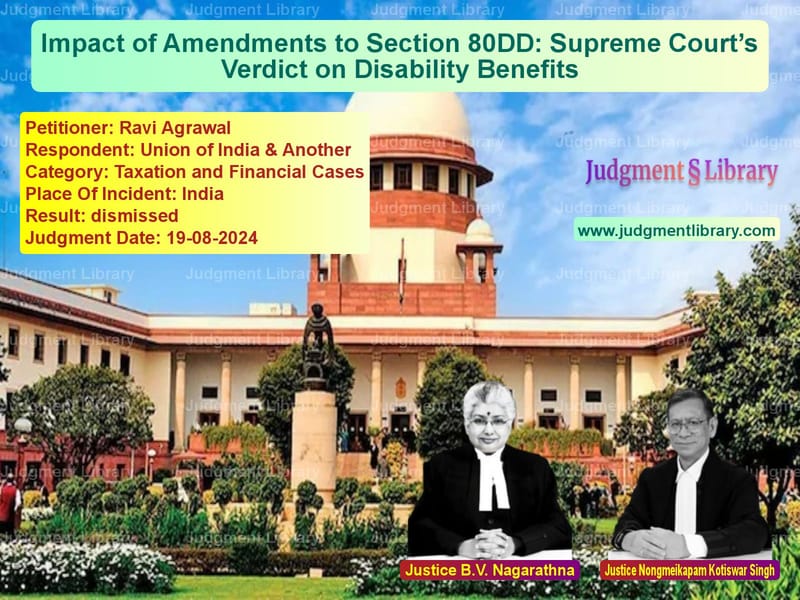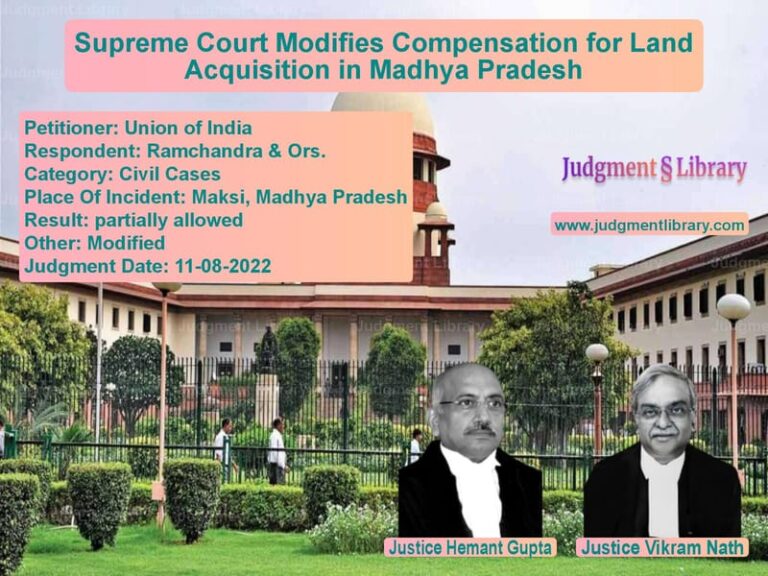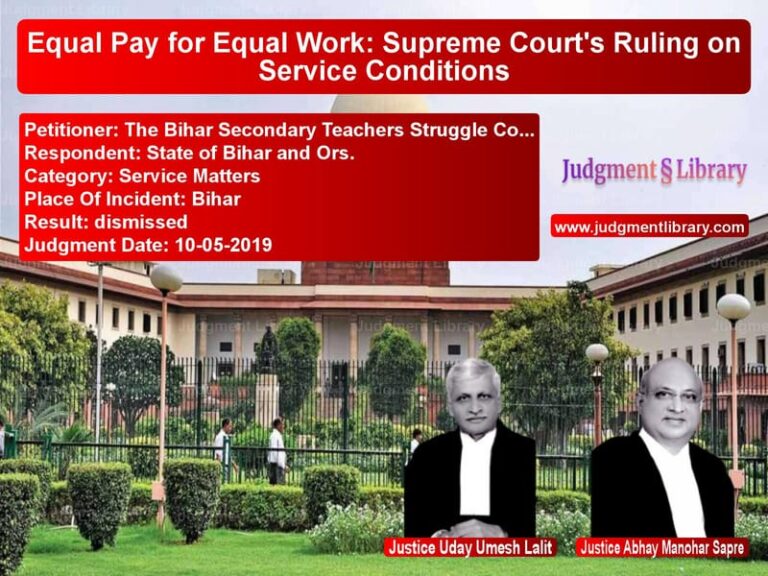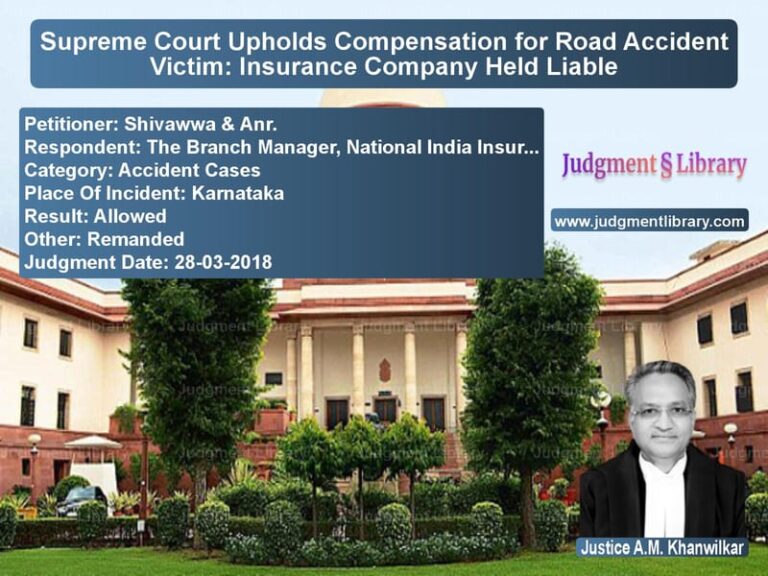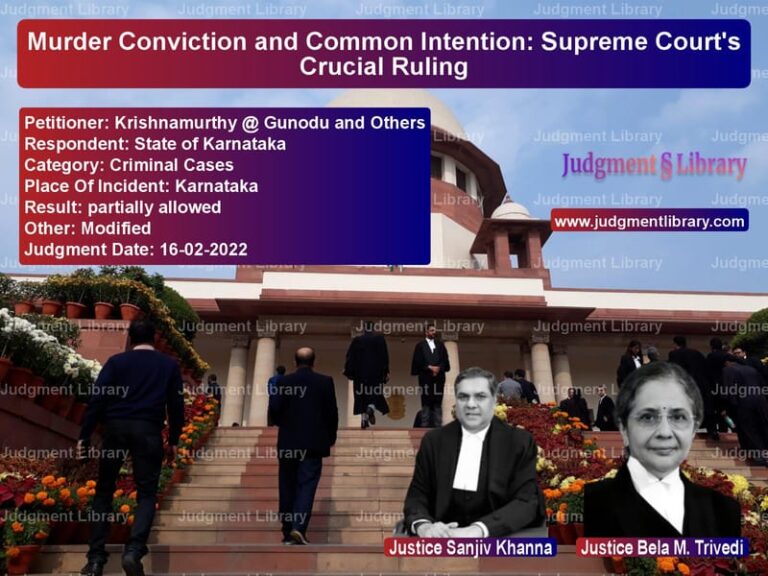Impact of Amendments to Section 80DD: Supreme Court’s Verdict on Disability Benefits
The case of Ravi Agrawal v. Union of India revolves around the amendment of Section 80DD of the Income Tax Act and the petitioner’s plea for retrospective applicability of the amendment. The Supreme Court examined whether the amendment should apply to policies taken before 2014, impacting many individuals who had subscribed to policies for the benefit of disabled dependents.
The petitioner sought the following reliefs:
- Implementation of the Central Information Commission’s decision of June 27, 2019.
- Recognition of the Supreme Court’s earlier judgment in W.P. (C) No.1107/2017 and initiation of necessary actions.
- Striking down Clause (a) of Sub-section (2) of Section 80DD as unconstitutional.
Arguments Presented
Petitioner’s Arguments
The petitioner’s counsel contended that the amendment under the Finance Act, 2022, allowed individuals aged 60 and above to discontinue contributions to a scheme under Section 80DD, permitting early benefits for disabled dependents. He argued that:
- The amendment should be applied retrospectively, benefiting policies taken before 2014.
- A retrospective application would allow existing subscribers and disabled individuals to utilize funds earlier.
- The amendment’s prospective effect (from April 1, 2023) limited its advantages to new policies, leaving out many individuals who had taken insurance under old schemes.
Respondent’s Arguments
The respondents opposed the retrospective application, stating:
- Section 80DD’s primary intent is to provide financial security for disabled individuals upon the caregiver’s death.
- The amendment was made in response to concerns raised in a previous case but was meant to apply only prospectively.
- Changing the terms of existing insurance contracts would disrupt the agreements under which premiums were paid.
Supreme Court’s Observations
The Supreme Court acknowledged the amendment’s positive impact but held that applying it retrospectively was neither feasible nor in the best interest of disabled beneficiaries. The Court reasoned that:
- Policies under Section 80DD were designed to provide posthumous financial security to disabled dependents.
- Allowing policyholders to withdraw benefits at 60 could undermine the purpose of these schemes.
- Insurance contracts are structured commercial agreements, and retrospective changes could affect their validity.
Final Judgment
The Court dismissed the petition, ruling that the amendment would remain prospective. It emphasized the importance of upholding the intent of Section 80DD while ensuring financial security for disabled individuals after the caregiver’s demise.
The judgment underscores the Court’s cautious approach in balancing legislative intent and policyholder rights, reaffirming that insurance laws must be interpreted in the spirit of their original objectives.
Petitioner Name: Ravi Agrawal.Respondent Name: Union of India & Another.Judgment By: Justice B.V. Nagarathna, Justice Nongmeikapam Kotiswar Singh.Place Of Incident: India.Judgment Date: 19-08-2024.
Don’t miss out on the full details! Download the complete judgment in PDF format below and gain valuable insights instantly!
Download Judgment: ravi-agrawal-vs-union-of-india-&-ano-supreme-court-of-india-judgment-dated-19-08-2024.pdf
Directly Download Judgment: Directly download this Judgment
See all petitions in Income Tax Disputes
See all petitions in Tax Refund Disputes
See all petitions in Judgment by B.V. Nagarathna
See all petitions in Judgment by N. Kotiswar Singh
See all petitions in dismissed
See all petitions in supreme court of India judgments August 2024
See all petitions in 2024 judgments
See all posts in Taxation and Financial Cases Category
See all allowed petitions in Taxation and Financial Cases Category
See all Dismissed petitions in Taxation and Financial Cases Category
See all partially allowed petitions in Taxation and Financial Cases Category

